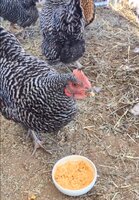- Thread starter
- #11
PlainChicks
In the Brooder
- Apr 16, 2018
- 25
- 4
- 39
The first pictures are the 2 girls affected most when they started looking better after the antibiotics were finished, the last 2 are the same girls a few months ago fat, happy and healthy. I’m not sure if they were vaccinated but I can find out









